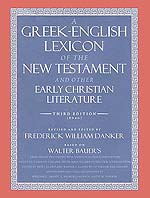 A
Greek-English Lexicon of the New Testament and Other Early Christian
Literature Third Edition (BDAG)
A
Greek-English Lexicon of the New Testament and Other Early Christian
Literature Third Edition (BDAG)
Third Edition (copyright 2000)
by Walter Bauer
Edited and revised by Frederick William Danker.
Described as an "invaluable reference work" (Classical Philology) and "a
tool indispensable for the study of early Christian literature" (Religious
Studies Review) in its previous edition, this new updated American edition
of Walter Bauer's Worterbuch zu den Schriften des Neuen Testaments builds on
its predecessor's staggering deposit of extraordinary erudition relating to
Greek literature from all periods. Including entries for many more words,
the new edition also lists more than 25,000 additional references to
classical, intertestamental, Early Christian, and modern literature.
Additional Detail
Perhaps the single most important lexical innovation of Danker's edition
is its inclusion of extended definitions for Greek terms. For instance, a
key meaning of episkopos was defined in the second American edition as
overseer; Danker defines it as "one who has the responsibility of
safeguarding or seeing to it that something is done in the correct way,
guardian." Such extended definitions give a fuller sense of the word in
question, which will help avoid both anachronisms and confusion among users
of the lexicon who may not be native speakers of English.
The Libronix DLS Edition
The BDAG print edition introduces typographical enhancements to help the
reader quickly scan the page and locate desired information. These
typographical features serve as visual landmarks indicating various
categories of information.
For the digital edition, we brought these typographical enhancements to the
screen but went one step further. We also created a special software feature
called "BDAG Search" that uses the typographical formatting as searchable
fields. This feature (a Logos exclusive!) means you can search with utmost
precision by limiting your query to specific sections of each entry in the
lexicon.
So what are these typographical features and how do they improve searching?
BDAG Typographical Features
Contrasting typefaces are used to differentiate
between commonly referenced parts of each entry in the lexicon. So a word's
extended definition is printed in bold while its gloss (also called a formal
equivalent) is in bold-italic. Translation equivalents (which accompany
quotations from Greek texts) are given in normal italic.
Built-In Functionality:
- New Testament citations are in blue
- Hover over a hotspot in red and a popup window shows the
quotation referenced (e.g., a passage from Josephus)
- Hover over a green link to unpack an abbreviation (e.g., inf.=infinitive)
or abbreviated citation
- The large, eye-catching graphic numerals and letters
delineate the outline structure of each entry
|
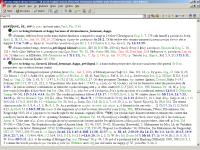 |
Searchable Fields:
- Extended Definition (bold):
An Extended Definition serves to "highlight the meanings of
words or their functional usage."
- Formal Equivalent (bold-italic):
A Formal Equivalent is akin to a gloss or synonym.
- Translation Equivalent (italic):
A Translation Equivalent is a suggested translation of preceding
Greek text. For instance, when a classical source is quoted, a
translation of the quoted text normally follows.
|
Each of these "fields" is searchable independently or in conjunction with
other fields within the text. To demonstrate, let's perform an example study
that involves searching specific fields within BDAG.
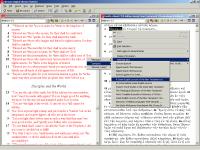 |
Suppose you are studying the Beatitudes in Matthew 5, looking at
an English translation and the Greek original side-by-side. You want
more information on the word μακαριος which is translated blessed in
the NASB, so you right-click on it in the Greek text and select the
BDAG lexicon. |
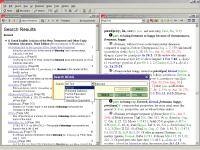 |
After reading the entry on μακαριος you want to dig deeper
into this concept of blessedness and its relationship to various
Greek words. Clicking "Search" on the toolbar automatically opens
the specialized Search BDAG dialog box. A search for blessed in all
BDAG fields results in 93 occurrences in 58 articles. Now let's
narrow that down… |
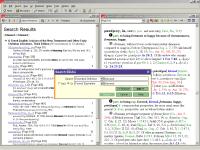 |
Perhaps you'd rather narrow the results to occurrences of
blessed in extended definitions or formal equivalents only. This
excludes occurrences within translation equivalents (e.g.,
translated quotations from classical sources) and gives a more
manageable list of 15 occurrences within 13 articles. Countless
other combinations of terms, fields and operators can be entered.
Greek text can also be entered in the Search BDAG dialog… |
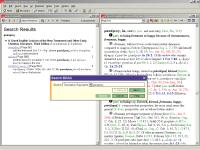 |
Suppose you'd like to find other occurrences of μακαριος in
examples the authors have pulled from biblical and extrabiblical
sources. What other contexts and translations are given for this
word within BDAG? You can enter the Greek word and limit the search
to the translation equivalent field, resulting in three occurrences
located within illustrative quotations given by the lexicon's
authors. |
Thanks to Frederick W. Danker's broad knowledge of Greco-Roman literature,
as well as papyri and epigraphs, the new BDAG provides a more panoramic view
of the world of Jesus and the New Testament. It incorporates new research,
new information, and analyses while rendering translations into contemporary
English. What is more, the LDLS version of this resource offers
unprecedented search capabilities customized to this reference work. Can you
continue doing Biblical study without it?
Reviews of the Print Edition
"It goes without saying that all scholars and students of early
Christianity will profit from BDAG and will want to own a copy of this fine
new edition." (more...)
Review of Biblical Literature, October 2002
by John T. Fitzgerald, University of Miami
"Any reader familiar with the second edition (BAGD - 1979...) will notice
an immediate and sharp improvement in semantic clarity and presentation in
this third edition." (more...)
Review of Biblical Literature, October 2002
by Terry Roberts, University of Sydney, Australia
"This is a beautiful, user-friendly book, and the editor and the
publisher deserve to be congratulated on its production. In physical
appearance as well as content it marks a change in the tradition of Bauer
lexicons." (more...)
Review of Biblical Literature, October 2002
by Abraham J. Malherbe, Yale University Divinity School
"Like its predecessor, Danker will be enormously helpful to students and
scholars working with the NT." (more...)
Review of Biblical Literature, October 2002
by Harold W. Attridge, Yale University Divinity School
"It is without doubt the best tool of its kind that exists in any
language, and the present edition is decidedly superior to the earlier ones."
(more...)
Bryn Mawr Classical Review, June 2001
by Jerker Blomqvist, Department of Classics, Lund University
Reviews of the Electronic Edition
"In all, an excellent alternative format with distinct advantages that
many will prefer to the print version." (more...)
Religious Studies Review, April 2003
by Michael Holmes, Bethel College
"This writer highly recommends one spending the extra cost of adding BDAG
to the Scholar’s Library. This combination will enhance an already valuable
resource." (more...)
Southwestern Journal of Theology, Fall 2003
by James R. Wicker, Southwestern Baptist Theological Seminary
| Стоимость CD-ROM: 15 у.е. |



